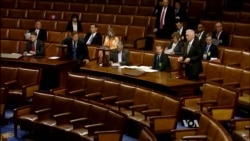Congress would have 60 days to review, debate, and vote on a nuclear pact with Iran, a timeframe that would include lawmakers’ annual August recess, which halts work in both chambers for an entire month. Additionally, it would come as Congress finds itself at partisan loggerheads over U.S. military and domestic funding, with deadlines fast approaching to sustain critical federal operations and initiatives.
Last week, Republican Senator John Cornyn stated what everyone in Congress already knows.
“There is a lot of work we have to do, that needs to be done,” Cornyn said.
Inaction on Capitol Hill already halted a U.S. trade facilitation entity, the Export-Import Bank, whose charter expired at the end of last month. Billions of dollars in federal funding for the nation’s highways is soon to run dry, with lawmakers deadlocked on a long-term solution. And another shutdown of non-essential federal operations looms unless Congress appropriates funds for next year by the end of September.
“This is about the dysfunction of Washington. It is what everybody detests,” said Democratic Congressman Donald Norcross. “This is our country. Do not shut it down.”
At time of heightened global tensions and persistent terrorist threats, Republicans want to boost military spending while maintaining budget caps on domestic programs. Fiscal discipline in the form of automatic, across-the-board budget cuts, combined with a growing U.S. economy, have helped shrink the yearly U.S. budget deficit from more than $1 trillion to less than $500 billion.
“I remain optimistic that this chamber can take up appropriations bills that are needed to fund our troops on the battlefield and care for our veterans upon their return,” said Cornyn.
Democrats say domestic priorities should not be shortchanged, especially given America’s improved fiscal outlook.
“It is time for Republicans to stop heading down this path that ends in gridlock and disaster for our federal budget, and to start getting serious about a budget deal that allows full funding of the federal government,” said Democratic Senator Charles Schumer.
But better deficit numbers will evaporate unless fiscal discipline is maintained, according to Republicans.
“The greatest threat facing our country is the national debt that exceeds our entire economy (GDP),” said Republican Congressman Tom McClintock. “Behold the chaos in Greece, and consider that our nation is not far behind.”
Democrats note that Republicans control both houses of Congress.
“This is how Republicans are governing,” said Senate Democratic Leader Harry Reid. “This is how they pretend to lead our country.”
Any spending bills passed by Congress could be signed or vetoed by President Barack Obama, who is being urged by lawmakers to convene a "budget summit" in hopes of bridging partisan differences.





